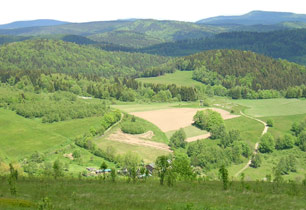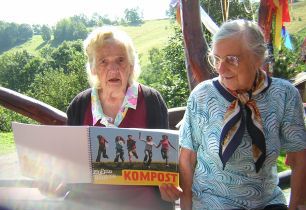|
THE LAND OF LIMITED IMPOSSIBILITIES
Here shoemakers become mystics and philosophers brewery workers, cities become villages, and villages boast theatres of international acclaim. Here people kindled fires with pages torn from Faust and drank homemade schnaps from Meissen porcelain. Some came from Vorkuta and Vladivostok against their will, and others would have stayed here forever but were given 30 minutes to leave. The limitation of impossibilities.
And here, too, you could live in 4 states and under 4 systems of power without even leaving home - like the P. family from ®acléø, also known as Schatzlar. Born subjects of the Austrian KuK monarchy, they became citizens of the Republic of Czechoslovakia only to wind up living in the Third Reich; as pensioners they lived in the Czechoslovak Socialist Republic. The limitation of impossibilities.
And here, too, you can find German skinheads harassing foreigners, supplied with Nazi relics by Polish dealers and serviced by Czech prostitutes. The limitation of impossibilities.
And here, too, a group of people who set up an independent library under dictatorship gather together in a small village; and in the mountains dissidents from Czechoslovakia and Poland meet. The limitation of impossibilities.
It is a fascinating region, for the Piasts, Habsburgs and Hohenzollerns it was an object of desire. Interface of Slavic and Germanic culture, it has been the site of countless migrations, political and cultural usurpation, personal and social tragedy.
We live in a landscape dynamic in every respect: political, social, economic and ecological. It is a dynamic that confuses and disorients. Only one generation living here today experienced the economy of wartime communism, the free market in its most extreme form (the crisis of 1929), the socialist plan and social market economies. Even the 14 year olds of today were born surrounded by barbed wire and minefields.
Yesterday's SED, PVAP and KSC voters fled from dictatorship and now they'd give anything to flee from freedom. "Socialist Internationalism" was replaced by national interests. Societies dressed up in the spirit of egalitarianism have been divided into winners and losers. The economic division of society has brought with it fears, xenophobia and aggression.
The political borders became borders of prosperity. The inhabitants of the Polish, Czech and German border zones are directly exposed to these processes and transformations. With the future expansion of the European Union into Poland and the Czech Republic the inhabitants of these regions are faced with new challenges. Not even the structures that emerged post-1989 have had the opportunity to fully stabilise, and now even newer structures are supposed to arise.
Living and working here demands new capabilities, understanding, macroeconomic processes and their influence on local development (globalisation). Different forms of multicultural societies have to be experienced, new forms of education and training have to be found.
Grzegorz Potoczak
|



